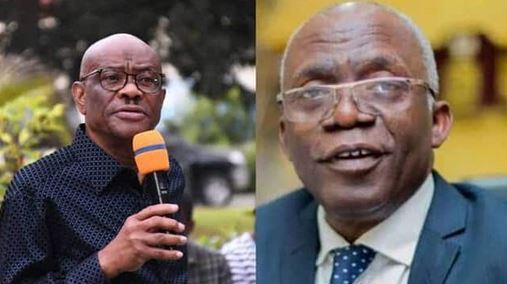Nyesom Wike, the Federal Capital Territory (FCT) Minister, has recently defended the federal government’s plan to build houses for judges, following criticism from human rights lawyer Femi Falana. Falana had claimed that constructing homes for judges was unconstitutional and undermined the independence of the judiciary.
Wike disagrees with this viewpoint. In a statement made by his Senior Special Assistant, Lere Olayinka, he argued that there is nothing wrong with providing accommodation for judges, as this is part of the government’s responsibility. Olayinka emphasized that while there is a separation of powers in democratic governance, there is also a system of checks and balances that ensures no branch of government is completely independent from the others.
This had drawn criticism, with Falana claiming that such action was capable of influencing the judges, “you cannot be seen to be giving cars or houses to judges who are going to determine your cases.”
Wike’s defense highlights that even in countries like the United States, where political factors may influence judicial nominations, the judiciary still operates within a framework of accountability and oversight. He further stated that the primary concern should be the comfort and security of judges, enabling them to perform their duties without undue distractions.
Olayinka asked; “Wouldn’t there still be need for land from the FCT Ministry if the houses were to be built by the judiciary? And if it is about exercising influence over the judiciary, is allocation of lands not enough?
“Also, the money to build the houses will still have to be appropriated by the National Assembly, peopled by politicians who also have cases before judges. Should we also say that bringing the budget of the judiciary to the National or State House of Assembly for passage will influence judges if cases involving the lawmakers are brought before them?
“Police and other security agencies provide security for judges and they do have court cases too, is Uncle Femi Falana also saying that the security agencies will influence the judges?
“Anti-Corruption agencies like the Economic and Financial Crimes Commission (EFCC) and the Independent Corrupt Practices and Other Related Offenses Commission (ICPC) investigate and prosecute judges, will Oga Femi Falana also say that investigation and trial of judges for alleged corruption should not be done by the anti-graft agencies so as to avoid influencing the judiciary?
“May be too, judges should create their own hospitals so that doctors, especially those in public hospitals won’t influence them. After all, medical practitioners too do have cases in court.
“Finally, may be judges should stop having friends and family members. They should be operating in seclusion so that no one will influence them. Or they should just create their own world so that they won’t be influenced by anyone.”
The Federal Executive Council (FEC) recently approved the construction of 40 housing units for judges in the FCT. These homes will be allocated to various courts, including the FCT High Court, the Federal High Court, and the Court of Appeal. The move aims to provide judges with secure and comfortable housing, which Wike believes is necessary for them to carry out their important work effectively.
“The Judicial Conference of the United States, and the Administrative Office of the U.S. Courts do not play any role in the nomination and confirmation of the justices.
“The justices are even known by their political leanings and today, the U.S. Supreme Court has a 6-3 conservative majority, meaning six for the Republican Party and three for the Democrats. Yet, the justices do their jobs without anyone accusing them of being influenced by the President and members of his party in the Senate and House who appointed them,” he said.







